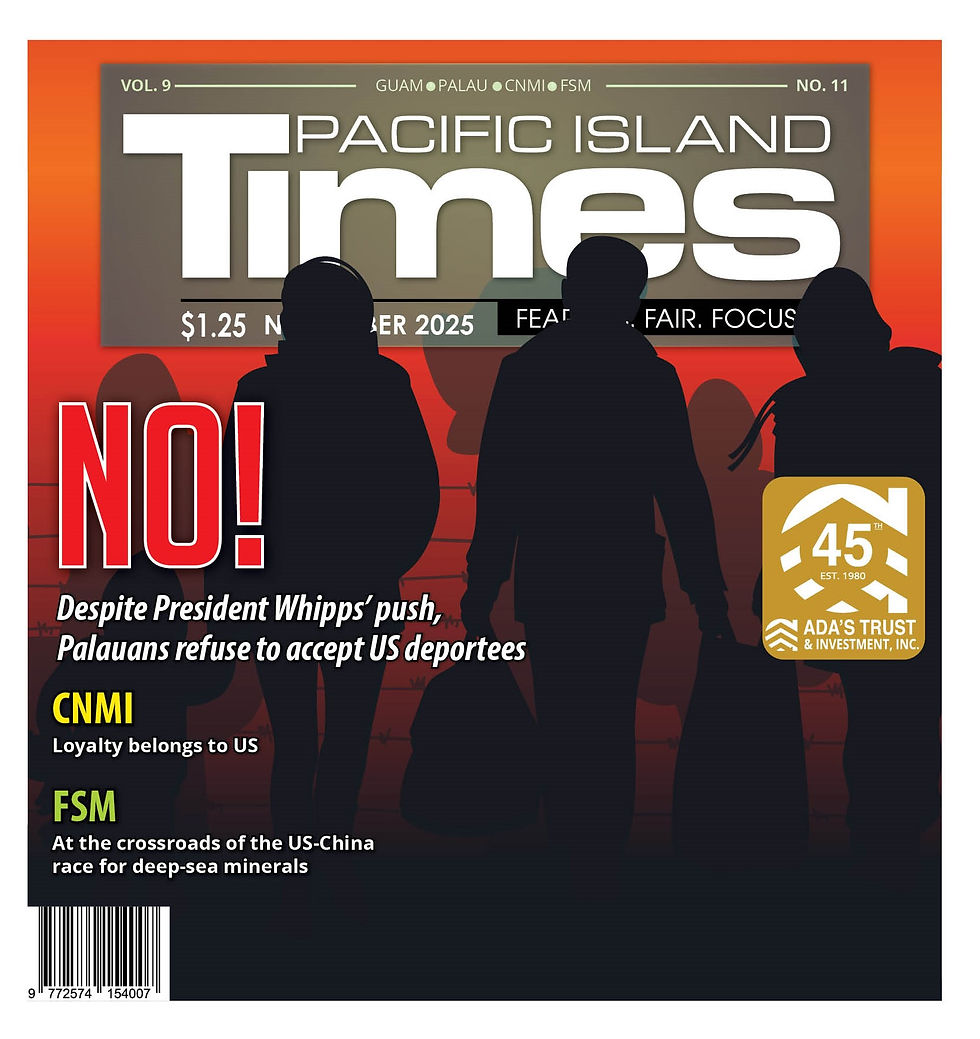'The best coral I’ve ever dived on in my life': Vanuatu’s waters among the healthiest in the Pacific, scientists say
- Admin

- Nov 12, 2025
- 4 min read

By Ron Rocky Coloma
When National Geographic Pristine Seas wrapped up its monthlong expedition in Vanuatu, the team left with more than just data; they left with optimism.
Led by veteran explorer Paul Rose, the mission explored the country’s reefs, volcanic seascapes and marine life across its 80-plus islands. The results, Rose said, exceeded expectations.
“At the end of this expedition, I have more energy than I did at the beginning,” Rose said. “Everything worked beautifully. We had some challenging conditions, but the team was incredible. We achieved everything and more.”
National Geographic’s Pristine Seas project has spent over a decade studying and protecting ocean ecosystems. In Vanuatu, researchers set out to document the health of coral reefs and marine life in an area known for both environmental leadership and cultural connection to the sea.
The team used a combination of deep-sea cameras, pelagic surveys and submarine dives from their research vessel Argo. What they found surprised even the most experienced scientists.
“We were having reports from the media team, who’ve seen it all, saying, ‘This is the best dive I’ve had in years,’” Rose said. “Whether deep or shallow, close to a village or remote, we consistently saw great conditions.”
Among the highlights were dives at the Kuwai Crater and Tongoa Wall, where coral scientist Dr. Eric Brown described the reefs as “the best coral I’ve ever dived on in my life.”
Rose said that in many parts of the world, reefs near communities show signs of overfishing and pollution. In Vanuatu, however, the opposite was often the case.
“We found that the waters close to the villages were amazing, just beautiful,” he said. “People know how to look after their ocean. They’ve been doing it for thousands of years.”
Vanuatu’s commitment to protecting its ocean has earned the country international recognition. The nation helped lead the International Court of Justice advisory opinion on climate change earlier this year and continues to push for ecocide to be recognized under international law.
“Vanuatu may be a relatively small nation, but it’s highly influential,” Rose said. “From government leadership to tiny communities, that same sense of environmental stewardship runs deep.”
The expedition aligns with the government’s 30 by 30 goal: protecting 30 percent of its ocean by 2030. Rose said this policy direction was clear at every level.
“From the political leadership to the remote villages, everyone we met understood the importance of managing their waters,” he said. “It’s a wonderful example of national commitment that works both top-down and bottom-up.”

For Pristine Seas, community collaboration is as central as scientific rigor. The team spent two years preparing for the mission, holding reconnaissance trips and meetings with Vanuatu’s fisheries and environmental agencies, local chiefs and coastal families.
“There’s no way we could just show up, do something and leave,” Rose said. “We arrive with big ears because we need to listen and learn.”
During the expedition, more than 300 people visited the Argo to see the research firsthand. Local fishers and students joined dives and boat trips, helping guide the scientists to areas that mattered most to their communities.
The findings from Vanuatu will help inform new marine protected areas and community management plans. The Pristine Seas team will spend the next year analyzing samples and footage before presenting their full scientific report and documentary film.
“It’s not for us to make the decisions,” Rose said. “We make the findings, work with local partners and present everything to them so they can act on the data.”
Vanuatu’s healthy reefs provide an encouraging contrast to global trends. Across much of the Pacific, coral bleaching, rising sea temperatures and destructive fishing practices have placed reef systems under severe stress.
Rose said Vanuatu’s success comes from the balance between traditional practices and modern policy.
“The reefs are resilient because they’re protected,” he said. “If it’s not overfished or polluted, it’s more resistant to heat damage from climate change.”
The expedition recorded a diverse array of species, including dugongs, seabirds, reef fish, and sharks. Rose said the team observed balanced ecosystems in most regions, a sign of a healthy ocean.

“If we see good top predators, it’s a great first indicator that the ecosystem is in balance,” he said. “We would have liked to see more sharks, but overall the system looks strong.”
Only the Reef Islands showed clear signs of overfishing, and even there, local communities were aware of the issue and eager to restore the area.
“They know all about it,” Rose said. “They’re using our work and their knowledge to manage it better.”
At COP30 climate talks in Belém, Brazil, Rose said Pacific nations like Vanuatu can bring a powerful message to the global stage.
“Continue the leadership,” he said. “You can’t go wrong standing on a small atoll with a chief who says, ‘We know the ocean.’ They understand that protection means more fish, more sustainability. It’s a simple message, but it’s the right one.”
He hopes that the message of practical ocean care, rooted in lived experience, resonates internationally.
“For thousands of years, they’ve lived off the sea in a completely sustainable way,” he said. “Now, with modern pressures coming, we need that same knowledge to guide the world.”
National Geographic Pristine Seas has helped establish 29 marine protected areas worldwide, covering more than 6.9 million sq.km. of ocean.
In Vanuatu, Rose said the team hopes their findings will strengthen the country’s ongoing protection plans and inspire others to follow.
Subscribe to
our digital
monthly edition







